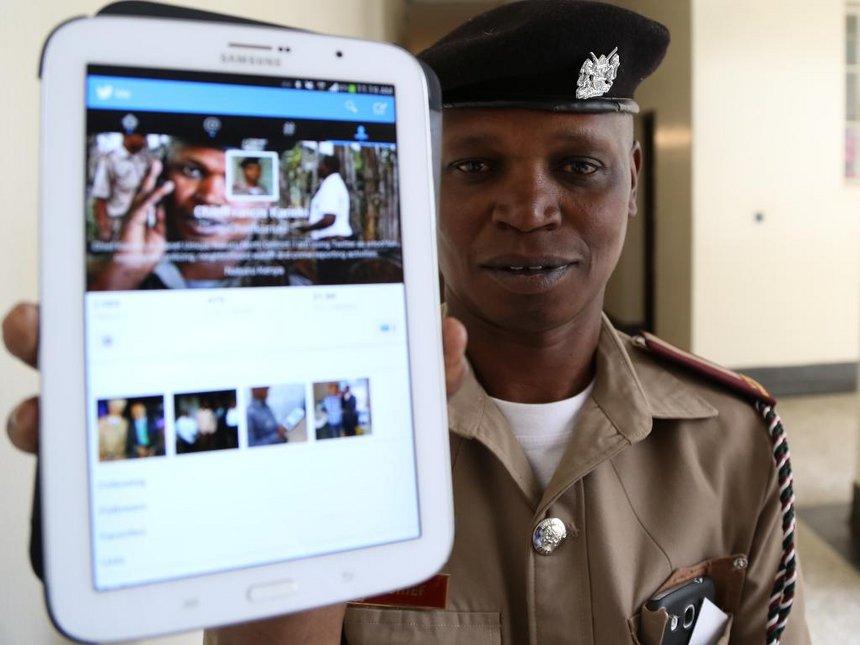
Lanet Umoja location chief Francis Kariuki, popularly known as the ‘tweeting chief’, is dead.
His son Ken Kariuki has confirmed that his father died on Wednesday while receiving treatment at the Nakuru Level Five Hospital.
Kenyanbulletin.com sends our condolenses to the family and friends.
Below is one of the many stories written about the chief in 2017
by FairPlanet.org
‘Wambui’s cow that was reported missing has been found in the trading center.’ This might pass as an ordinary message but it is one of the many tweets a chief in a semi-urban area in Kenya’s Rift Valley province is using to fight crime, alert locals on missing persons or livestock.
Chief Francis Kariuki whose uses the twitter handle @Chiefkariuki is a household name in his area for averting catastrophes and mobilizing the locals to unique causes. If he is not alerting them about a cow that has fallen in an open hole, he is mobilizing them to construct a local water dam or calling on the country’s big boys like the electricity utility company Kenya Power to restore power to his people.
And while he has over 62,000 followers on his twitter page, they are not all from his area. In fact, majority of the people in Lanet Umoja Location where he serves do not have access to Twitter or smartphones and rely on cheap phones. They have however subscribed to his tweets through a third-party provider which means they can easily get his tweets as text messages without incurring any cost.
“I once had my daughter missing while coming from school. She didn’t report home as is usually the norm. I got desperate and talked to Chief Kariuki about it. He sent a message from his phone to everyone and within two hours my daughter had been located some 50 kilometres having followed a stranger. I don’t know how I would have lived without my daughter,” Judy Mukami a peasant farmer recalls.
Francis Kariuki is the chief of LanetUmoja located in the Nakuru North Sub-County of Nakuru County in Kenya. He was a school teacher for 21 years and later joined the president’s office as the chief-in-charge of LanetUmoja location. The area has a population of 29000 people. – Internet Source
A former school principal, Chief Kariuki has revolutionized how technology can bridge information gap especially to the underserved communities. At a time when social media has become ubiquitous and powerful as a tool for voicing dissenting opinions, passing information and interacting among others, he has embraced it to keep his rural people abreast of what is happening in the world. Serving 29,000 people has meant that everyday there are dozens of issues and problems that require his attention, and he has been glad to rise to the occasion. “There are all sorts of problems that will come up. From a child who has fallen to a pit, a robbery, or fundraising for a student whose parents are struggling with school fees. But the beauty of it is seeing the impact. Seeing people coming together united in a cause and solving these problems. That is what makes it worth doing,” said Chief Kariuki who first joined twitter in 2011 and was mesmerized by its potential to reach critical mass within a short time.
In one of the most memorable incidents, a school teacher’s house was once raided by thieves. The teacher managed to alert the chief through an SMS. Within minutes the chief had tweeted and the entire community had congregated at the teacher’s house forcing the thieves to run. In another incident, a vehicle was reported stolen at 5pm and by midnight it had been recovered following the chief’s tweet.
“You have to be awake and alert at all times, because you might get an alert or a distress call anytime. The community has a lot of faith in me so I have to respond in real time. It could mean the difference between life and death,” said Chief Kariuki. Interestingly he says that even thieves from his area follow him on twitter.
But Kariuki who holds public meetings with community members twice every month believes that this new communication strategy has assisted him to cut costs. While he would traditionally use fliers and posters to pass around messages and invite the locals for community meetings, locally christened barazas, he now conveniently does it at the click of a button. This, he says has also tamed cutting trees and champion environmental conversation causes.
“It is one of the most prolific and innovative idea I have ever seen. Since I cleared university education a year ago and now looking for a job, I have benefitted from the chief’s tweets. Sometimes he will announce short term job openings in our area and my friends and I will go try our luck. It is how we have managed to get manual jobs,” Andrew Ndiritu a job seeker said.
Industry players have hailed Chief Kariuki’s model as the perfect tool to bridge the digital divide at a time when studies have raised concerns over a huge percentage of population, especially those in rural areas, still lagging behind in embracing information technology. “What Chief Kariuki is doing is vital especially at a time when pundits are exploring cheaper options of roping everyone to the digital bandwagon. It has proven effective, sustainable and most importantly cheap. It is the way to go in reaching the rural population,” said Mwikali Lloyd an East African ICT consultant.





















